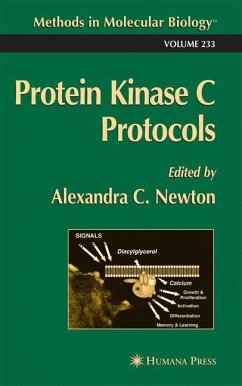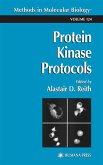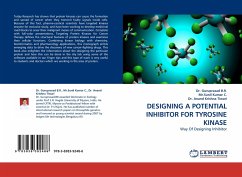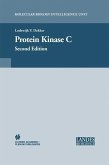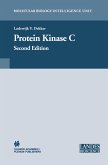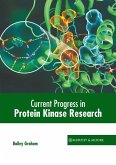The first compilation of classic and emerging laboratory techniques for the study of the biochemistry and cell biology of protein kinase C (PKC). Described in step-by-step detail, these methods can be easily used to explore the structure, function, regulation, subcellular localization, and macromolecular interactions of protein kinase C.. Each protocol is introduced in the context of PKC function and regulation and contains many notes on how best to deal with the problems that may occur. Comprehensive and authoritative, Protein Kinase C Protocols is a timely compilation of biophysical, biochemical, cell biological, and molecular biological approaches that brings protein kinase C research into any laboratory interested in studying it.
Since the discovery that protein kinase C (PKC) transduces the ab- dance of signals that result in phospholipid hydrolysis, this enzyme has been at the forefront of research in signal transduction. Protein Kinase C Protocols covers fundamental methods for studying the structure, function, regulation, subcellular localization, and macromolecular interactions of PKC. Protein Kinase C Protocols is divided into 11 sections representing the major aspects of PKC regulation and function. Part I contains an introduction and a historical perspective on the discovery of PKC by Drs. Yasutomi Nishizuka and Ushio Kikkawa. Part II describes methods to purify PKC. Part III describes the standard methods for measuring PKC activity: its enzymatic activity and its stimulus-dependent translocation from the cytosol to the membrane. Part IV describes methods for measuring the membrane interaction of PKC in vivo and in vitro. Part V provides methodologies and techniques for measuring the ph- phorylation state of PKC, including a protocol for measuring the activity of PKC's upstream kinase, PDK-1. Novel methods for identifying substrates are described in Part VI. Part VII presents protocols for expressing and analyzing the membrane targeting domains of PKC. Part VIII provides a comprehensive c- pilation of methods used to identify binding partners for PKC. Part IX describes pharmacological probes used to study PKC. The book ends with a presentation of genetic approaches to study PKC (Part X) and a discussion of approaches used to study PKC in disease (Part XI).
Since the discovery that protein kinase C (PKC) transduces the ab- dance of signals that result in phospholipid hydrolysis, this enzyme has been at the forefront of research in signal transduction. Protein Kinase C Protocols covers fundamental methods for studying the structure, function, regulation, subcellular localization, and macromolecular interactions of PKC. Protein Kinase C Protocols is divided into 11 sections representing the major aspects of PKC regulation and function. Part I contains an introduction and a historical perspective on the discovery of PKC by Drs. Yasutomi Nishizuka and Ushio Kikkawa. Part II describes methods to purify PKC. Part III describes the standard methods for measuring PKC activity: its enzymatic activity and its stimulus-dependent translocation from the cytosol to the membrane. Part IV describes methods for measuring the membrane interaction of PKC in vivo and in vitro. Part V provides methodologies and techniques for measuring the ph- phorylation state of PKC, including a protocol for measuring the activity of PKC's upstream kinase, PDK-1. Novel methods for identifying substrates are described in Part VI. Part VII presents protocols for expressing and analyzing the membrane targeting domains of PKC. Part VIII provides a comprehensive c- pilation of methods used to identify binding partners for PKC. Part IX describes pharmacological probes used to study PKC. The book ends with a presentation of genetic approaches to study PKC (Part X) and a discussion of approaches used to study PKC in disease (Part XI).
"...a comprehensive collection of established and emerging techniques used for the study of protein kinase C, and is quite simply an essential guide for any lab interested in cell signallin...an impressive collection of expert contributors...this is an excellent lab manual which provides very detailed and easy to follow methods and instructions that would be useful for any lab that is interested in any form of cell signalling..." - Proteomics "...a valuable book for everybody interested in PKC, and it is a must for everybody doing research with it." - ChemBioChem

